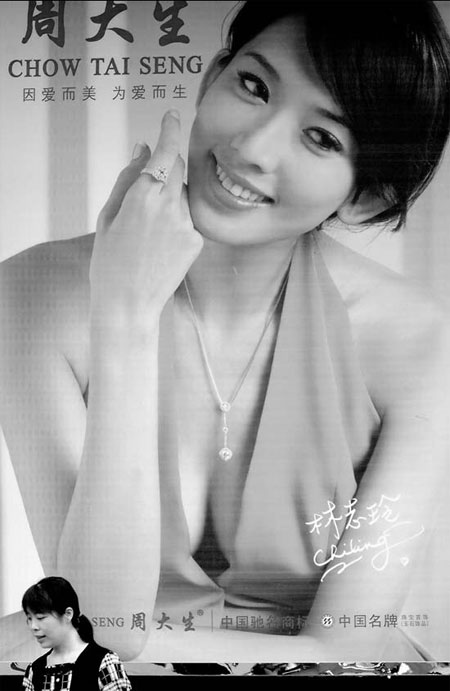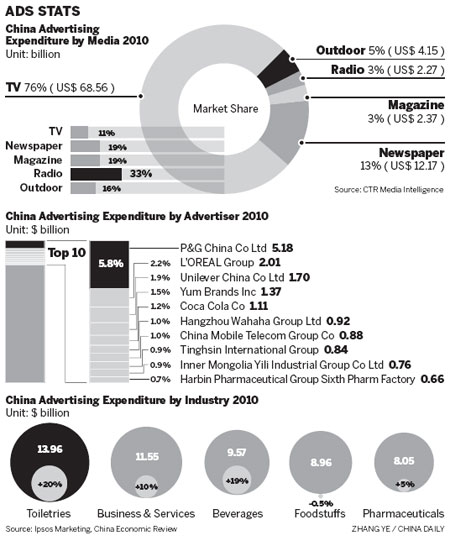TV still winner in advertising market - by far
Updated: 2011-08-02 11:28
By Wendy Qian (China Daily)
|
|||||||||||
 |
|
A huge billboard advertiing Chow Tai Seng's jewelry in Yichang, in Hubei province. Luxury brands are the main big advertisement buyers in the Chinese market.?[Photo /?China Daily] |
BEIJING - China's macroeconomic stability is paving the way for its advertisement market to grow bigger this year, according to the latest report from Charm Communications Inc.
Market revenue grew 10 percent during the first quarter of 2011, and at least 15 percent this year, according to Charm, a leading advertising agency in China.
In 2010, traditional adverts (excluding those on the Internet) generated 584.76 billion yuan ($90 billion) of revenue, with 77 percent of it (450 billion yuan) going to the television advertisement market.

This trend continued during the first quarter of 2011. Among the five different communication outlets, television remains the most popular for advertisers. During the first quarter, television advertisement generated 81.4 percent (121 billion yuan) of the total advertisement market revenue.
The report found that an increase in viewers led to an increase in the price of provincial channel advertisement slots. Demand for national television (CCTV) airtime increased more than the demand for slots on provincial TV channels. Last year, CCTV generated 9 percent (40 billion yuan) of revenue in the TV advertisement market.
Many established brands need to reach audiences nationwide. Recent brands buying CCTV airtime include Midea's air conditioners. Advertisers such as BBK Electronics also prioritize famous provincial channels that have national viewership, such as Hunan TV.
Charm's report showed that five major types of products (cosmetics, pharmaceuticals, foods, beverages, and services) comprise 63.8 percent of television advertising. The number of alcohol commercials on television alone increased 58 percent.
Group-buying adverts
Charm analysts also spotted a new trend. Sohu, Taobao, and Tencent all recently joined the ranks of group-buying sites that have emerged as a new industry in China. Their aggregate investment in television advertisement shows tough competition among the companies. "Group-buying sites will become the dark horse of the advertisement market in 2011," the analysts said.
The report discovered that the threshold for starting a group-buying site is relatively low and that customers rarely commit to one group-buying site. Group-buying sites therefore compete for name recognition by investing more and more in advertising. Major group-buying websites such as Lashou, Nuomi and Groupon have invested more than 10 million yuan in television advertising in China.
"Since television is still the most trusted media platform, advertising on television can increase the credibility of group-buying sites," the analysts told China Daily
However, after the first wave of competition among group-buying sites fades away, the most recognized sites will stay and they will significantly decrease their investment in advertising.
Because of recent house-buying restrictions imposed by the government, large and well-known brands in the real estate industry invested heavily in advertising, increasing the number of their CCTV commercials by 199 percent during the first quarter. "In order to survive the 'winter' of limited house-buying, large corporations will spend their funds on advertising to outcompete the others," the analysts said.
Internet advertising has also increased rapidly with the advent of smart phones and 3G availability. Chinese people are spending more time browsing the Internet everywhere and anywhere. A total of 3.76 billion yuan of advertisement revenue went to Internet sites during the first quarter, a 35.5 percent increase from 2010's first quarter. Pizza Hut became the first corporation to advertise on a microblog site this year.
Online video sites have also used their high level of traffic to attract advertising. For example, Youku bought the screening rights of many original and imported television series to attract traffic, including the famous Korean series Princess Hours. In the first quarter of 2011, Youku earned 163 percent more than last year's first quarter.
According to a 2009 report researched by the China Internet Network Information Center, around 200 million Internet users watch television less frequently than before. Charm findings also indicated that relative to the traditional television audience, Internet television targets audiences that are younger, richer and better educated. Analysts suggested if the brand targets urban and/or young customers, it should advertise on Internet television. However, television is still the first choice for many companies because it still enjoys a larger audience base, better credibility and shows better original programs.
Analysts suggested that rather than competing with each other, Internet television and traditional television should complement each other. Stations often air their shows the second time around on the Internet to reach different groups of audiences and earn more revenue.